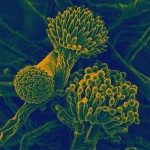Link to Pubmed [PMID] – 25527294
Semin Immunopathol 2015 Mar;37(2):107-16
A large variety of fungi are present in the environment, among which a proportion colonizes the human body, usually without causing any harm. However, depending on the host immune status, commensals can become opportunistic pathogens that induce diseases ranging from superficial non-harmful infection to life-threatening systemic disease. The interplay between the host and the fungal commensal flora is being orchestrated by an efficient recognition of the microorganisms, which in turn ensures a proper balance between tolerance of the normal fungal flora and induction of immune defense mechanisms when invasion occurs. Pattern recognition receptors (PRRs) play a significant role in maintaining this balance due to their capacity to sense fungi and induce host responses such as the induction of proinflammatory cytokines involved in the activation of innate and adaptive immune responses. In the present review, we will discuss the most recent findings regarding the recognition of Candida albicans and Aspergillus fumigatus and the different types of immune cells that play a role in antifungal host defense.

